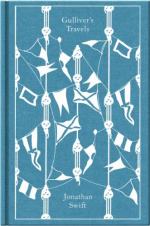|
This section contains 6,821 words (approx. 23 pages at 300 words per page) |

|
SOURCE: "Trompe l'Oeil': Gulliver and the Distortions of the Observing Eye," in University of Toronto Quarterly, Vol. 53, No. 2, Winter 1983/84, pp. 166-80.
In the following essay, Oakleaf examines how advancements in the capabilities of visual instruments in the eighteenth century destabilized notions of authoritative fixed points of view, causing philosophers, artists, and writers to reevaluate notions of one's ability to observe as well as the inherent bias of personal perspective.
Lemuel Gulliver, the narrator of Travels into Several Remote Nations of the World, is obviously an observer. The very title of his narrative appeals to popular interest in observations brought back from voyages of exploration—voyages that represent a geographical conquest of space contemporary with Europe's mathematical conquest of space during the seventeenth-century scientific revolution. Peering through windows and eye glasses and perspective glasses, Gulliver observes both nature and manners. He observes natural curiosities, donating some giant wasp stings...
|
This section contains 6,821 words (approx. 23 pages at 300 words per page) |

|


